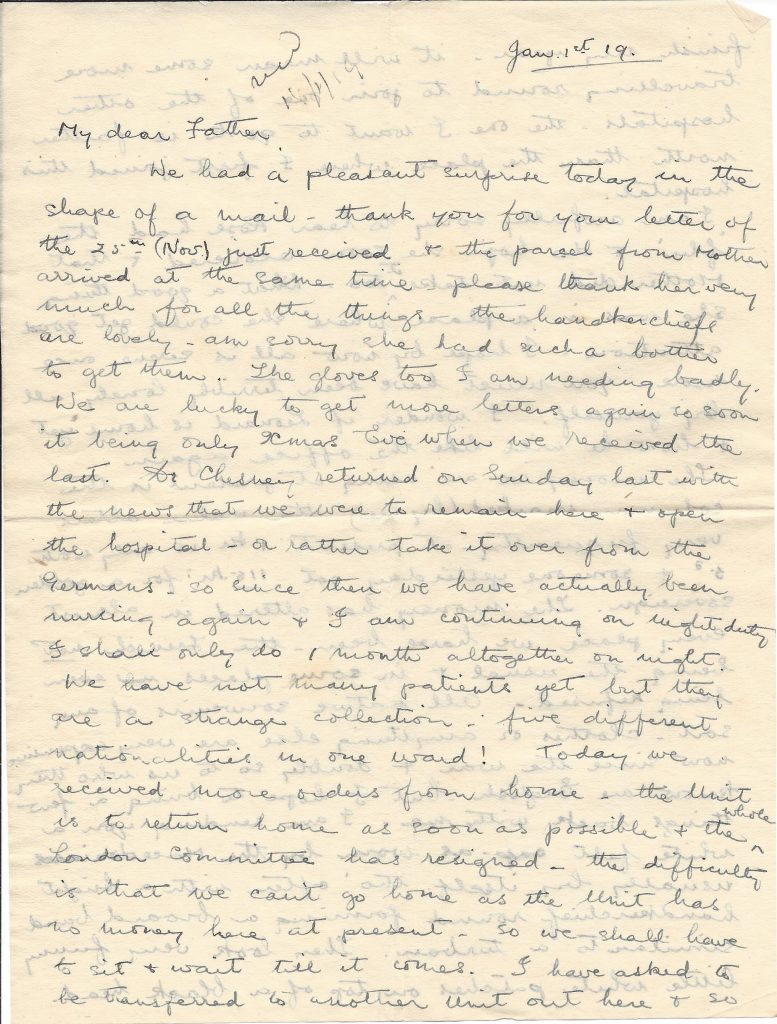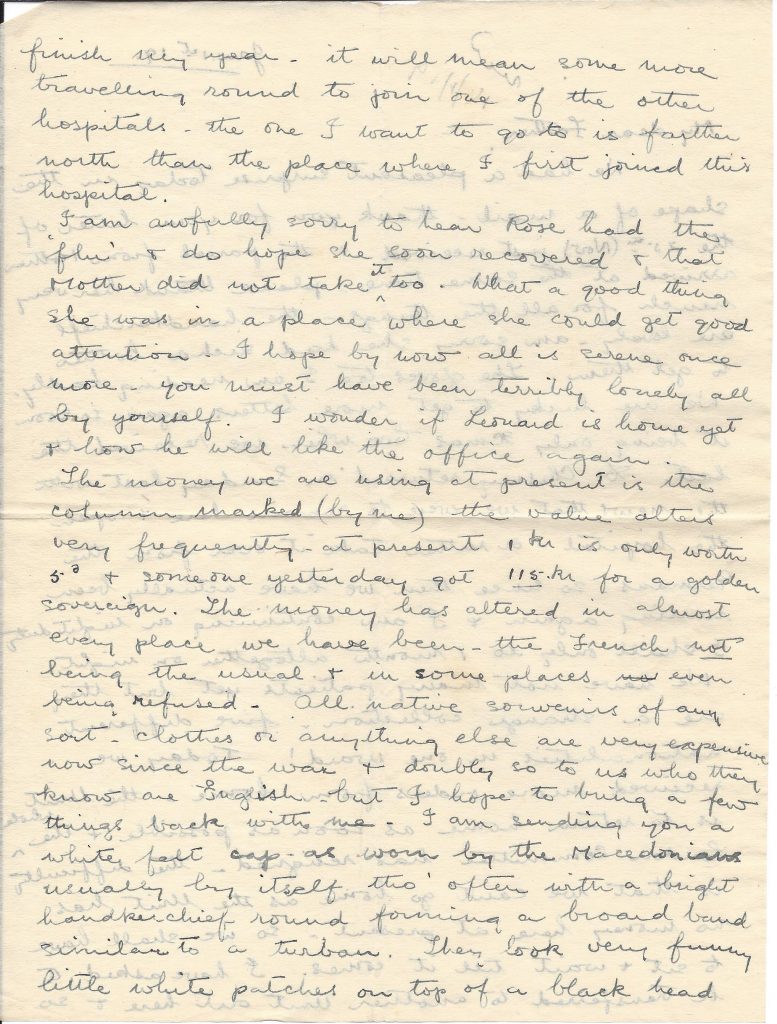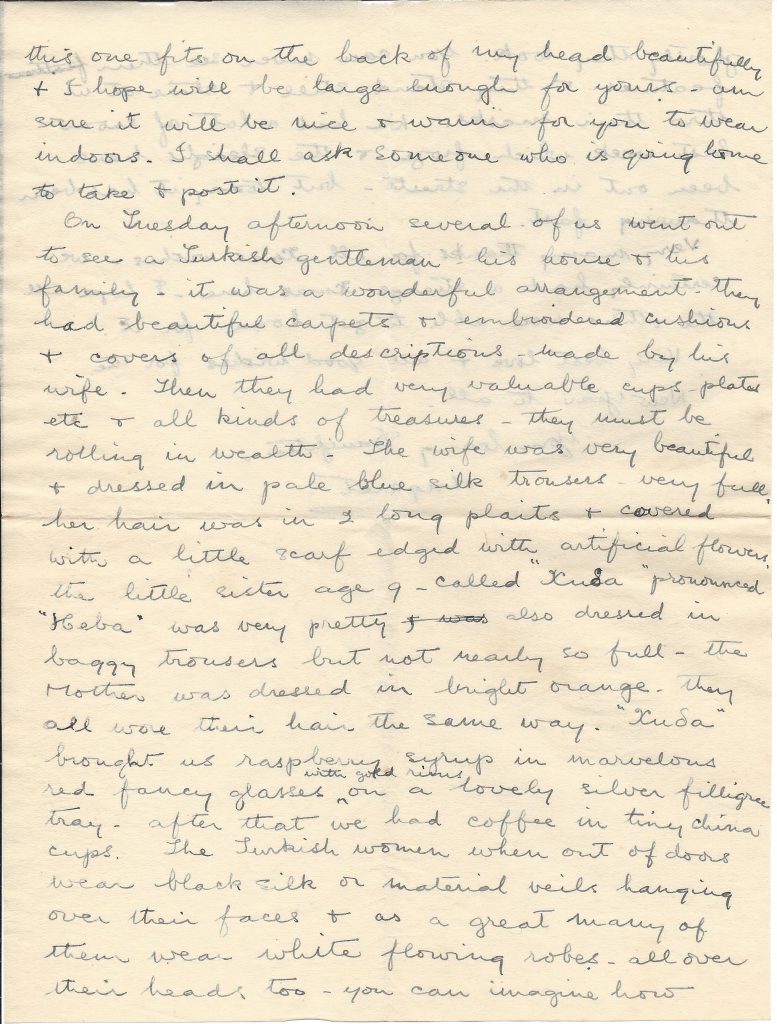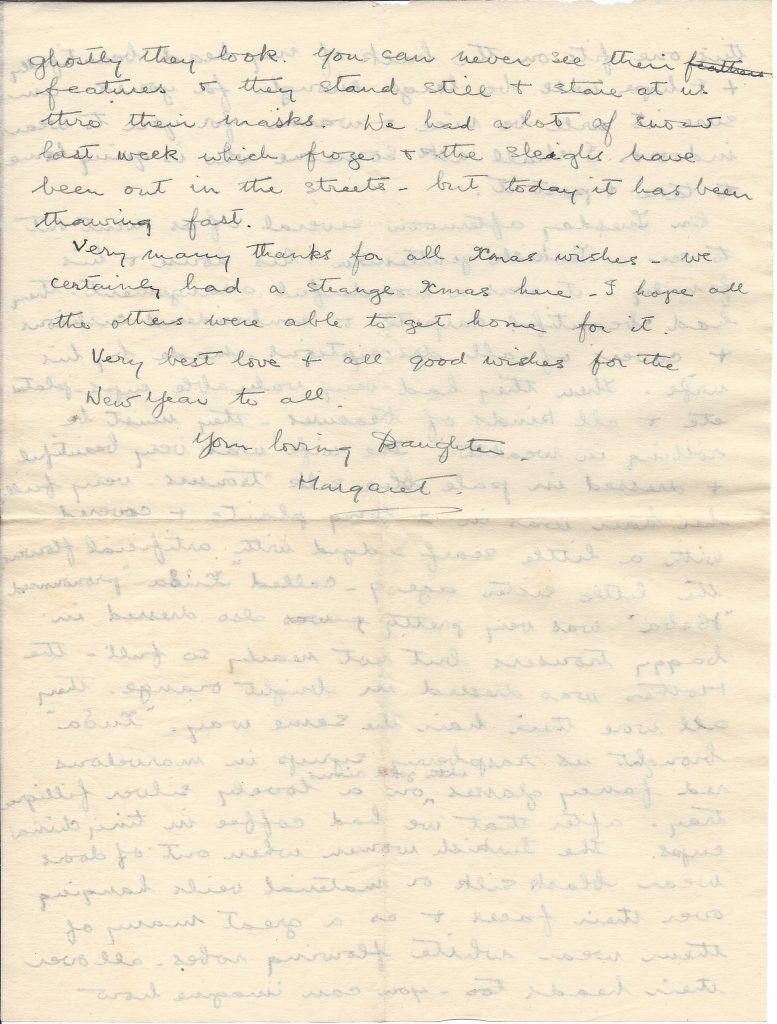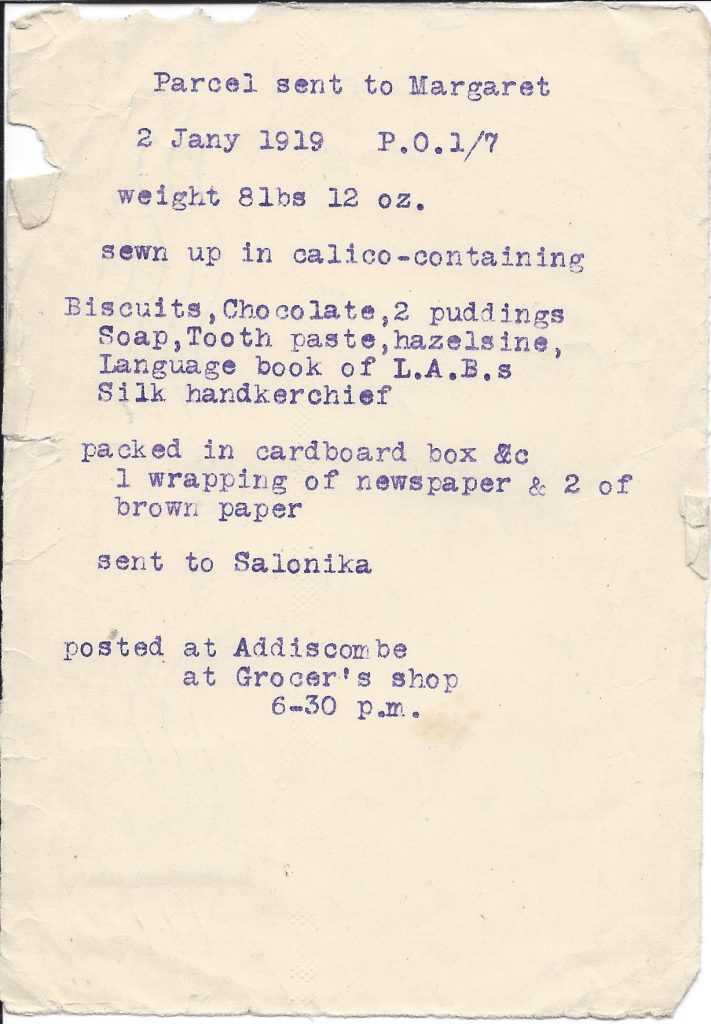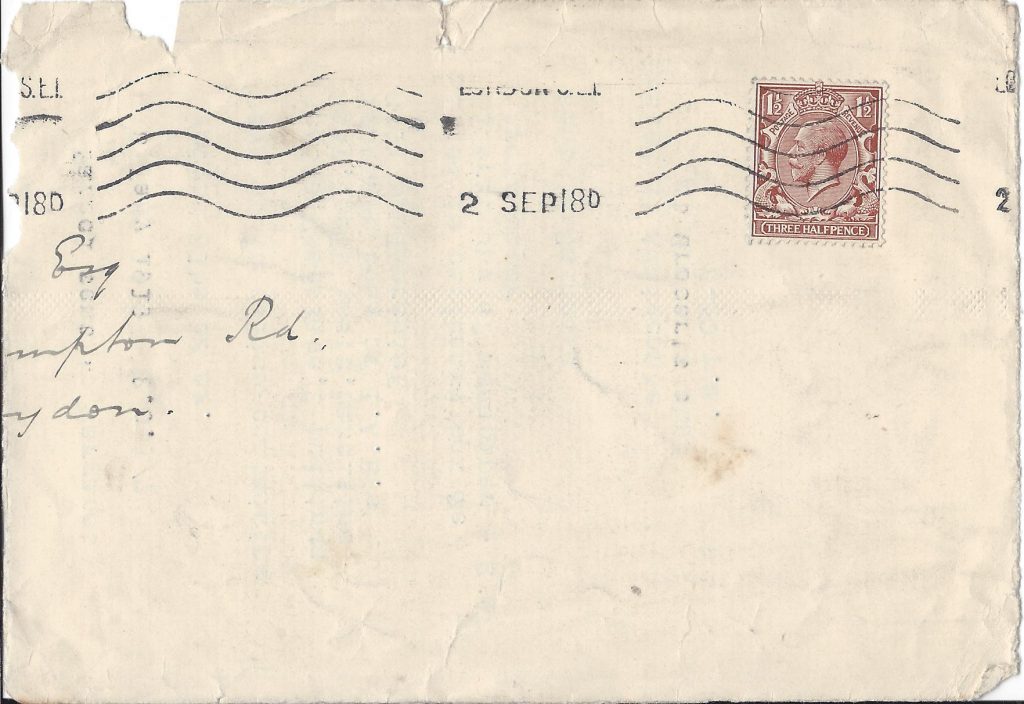Margaret Ada Box started the year 1919 far from home (Croydon), in a hospital in Sarajevo, where she was a Red Cross Nurse with the Scottish Women’s Hospitals. Although the First World War was over, sickness and disease – particularly the Spanish Flu, meant there was a great need for medical attention. The Armistice had been signed, but many of the causalities of war needed treatment for their injuries.
Margaret was my Great Aunt, and I have inherited many of the letters she wrote home. Here she writes to her father, my Great Grandfather, on the first of January 1919.
My dear Father
We had a pleasant surprise today in the shape of a mail. Thank you for your letter of the 25th (Nov) just received & the parcel from Mother arrived at the same time. Please thank her very much for all the things, the handkerchiefs are lovely, am sorry she had such a bother to get them. The gloves too I am needing badly.
We are lucky to get more letters again so soon, it being only Xmas Eve when we received the last. Dr Chesney returned on Sunday last with the news that we were to remain here & open the hospital – or rather take it over from the Germans. So since then we have actually been nursing again & I am continuing on night duty. I shall only do 1 month altogether on nights.
We have not many patients yet, but they are a strange collection – five different nationalities in one ward! Today we received more orders from home. The unit is to return home as soon as possible & the London Committee has resigned. The difficulty is that we cant’ go home as the Unit has no money here at present. So we shall just have to sit & wait till it comes. I have asked to be transferred to another Unit out here & so finish my year. It will mean some more travelling round to join one of the other hospitals. The one I want is farther north than the place where I first joined this hospital.
I am awfully sorry to hear Rose had the ‘flu’ & do hope she soon recovered & that Mother did not take it too. What a good thing she was in a place where she could get good attention. I hope by now all is serene once more. You must have been terribly lonely all by yourself. I wonder if Leonard is home yet & how he will like the office again.
The money we are using at the moment is the column marked (by me) the value alters very frequently at present 1 kr is only worth 5d & someone yesterday got 115 kr for a golden sovereign. The money has altered in almost every place we have been, the French not being the usual & in some places even refused. All native souvenirs of any sort, clothes or anything else are very expensive now since the war & doubly so to us who they know are English but I hope to bring a few things back with me. I am sending you a white felt cap, as worn by the Macedonians, usually by itself tho’ often with a bright handkerchief round forming a broad band similar to a turban. They look very funny, little white patches on top of a black head. This one fits on the back of my head beautifully & I hope will be large enough for you. Am sure it will be nice & warm for you to wear indoors. I shall ask someone who is going home to take & post it.
On Tuesday afternoon several of us went out to see a Turkish gentleman, his house & his family. It was a wonderful arrangement. They had beautiful carpets & embroidered cushions & covers of all descriptions made by his wife. Then they had very valuable cups, plates etc & all kinds of treasures, they must be rolling in wealth. The wife was very beautiful & dressed in pale blue silk trousers, very full. Her hair was in 2 long plaits & covered with a little scarf edged with artificial flowers. The little sister age 9 – called “Xuda” pronounced “Heba” was very pretty, also dressed in baggy trousers, but not nearly so full. The Mother was dressed in bright orange. They all wore their hair the same way. “Xuda” brought us raspberry syrup in marvellous red fancy glasses with gold rims, on a lovely silver filigree tray. After that we had coffee in tiny china cups. The Turkish women when out of doors wear black silk or material veils hanging over their faces & a great many of them wear white flowing robes, all over heads too. You can imagine how ghostly they look. You can never see their features & they stand still & stare at us through their masks.
We had a lot of snow last week which froze & the sleighs have been out on the streets, but today it has been thawing fast.
Very many thanks for all the Xmas wishes. We certainly had a strange Xmas here. I hope all the others were able to get home for it.
Very best love to all & all good wishes for the New Year to all
Your loving Daughter
Margaret
Notes
The Parcel
Connecting across a century, sending parcels to Europe was associated with a requirement for a customs declaration, which, from a historical point of view generated some interesting documentation, even if it was probably a nuisance at the time. I don’t have the customs declaration, but there is an itemised list of the contents of this parcel.
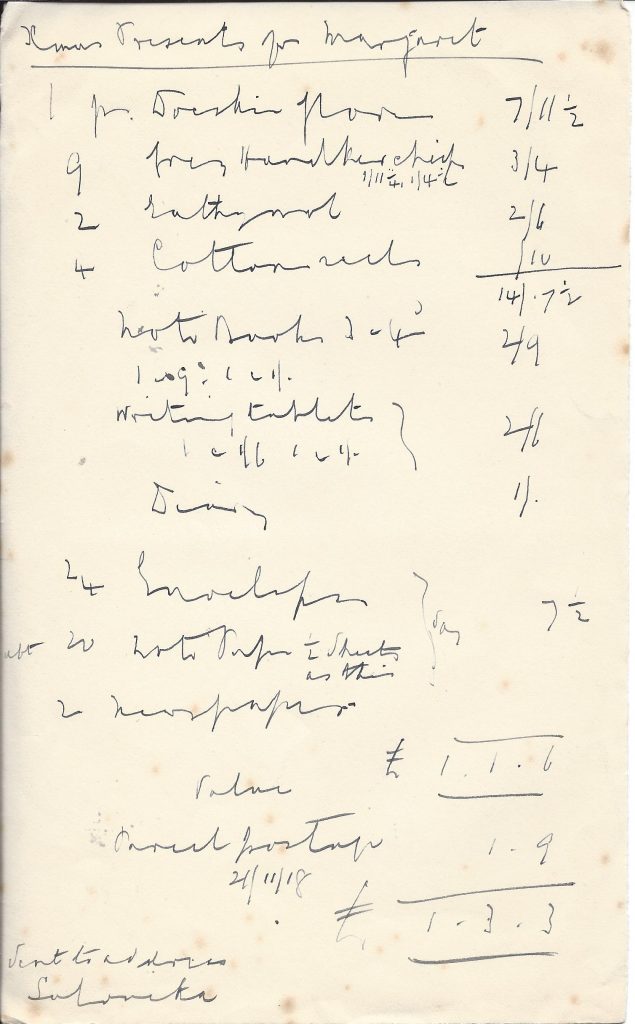
- 1 pair (something)
- 9 (something) Hankerchief
- 2 (something)
- 4 Cotton ?socks
- –
- Total for clothes
- Something
- Writing (something )
- 7/11 ½
- 1/4
- 2/6
- /10
- ——–
- 14/7 ½
- 2/9
- 2/6
I hope to return to decoding John Box’s handwriting, to complete the list, but I am sure Margaret was very glad to replenish her supplies of stationary and socks, handkerchiefs etc.
John Box did make a list of what was sent – typed on the back of an old envelope, with some more information.
Parcel sent to Margaret
2 Jany 1919 P.O.1/7
weight 8lbs 12 oz.
sewn up in callico – containing
Biscuits, Chocolate, 2 puddings, Soap, Tooth paste, hazelsine, Language book of L.A.B.s, Silk handkerchief
packed in cardboard box &c
1 wrapping of newspaper & 2 of brown paper
sent to Salonika
posted at Addiscombe at Grocer’s shop 6-30 p.m.
Money
The exchange rate table, which Margaret presumably enclosed with this letter is interesting.
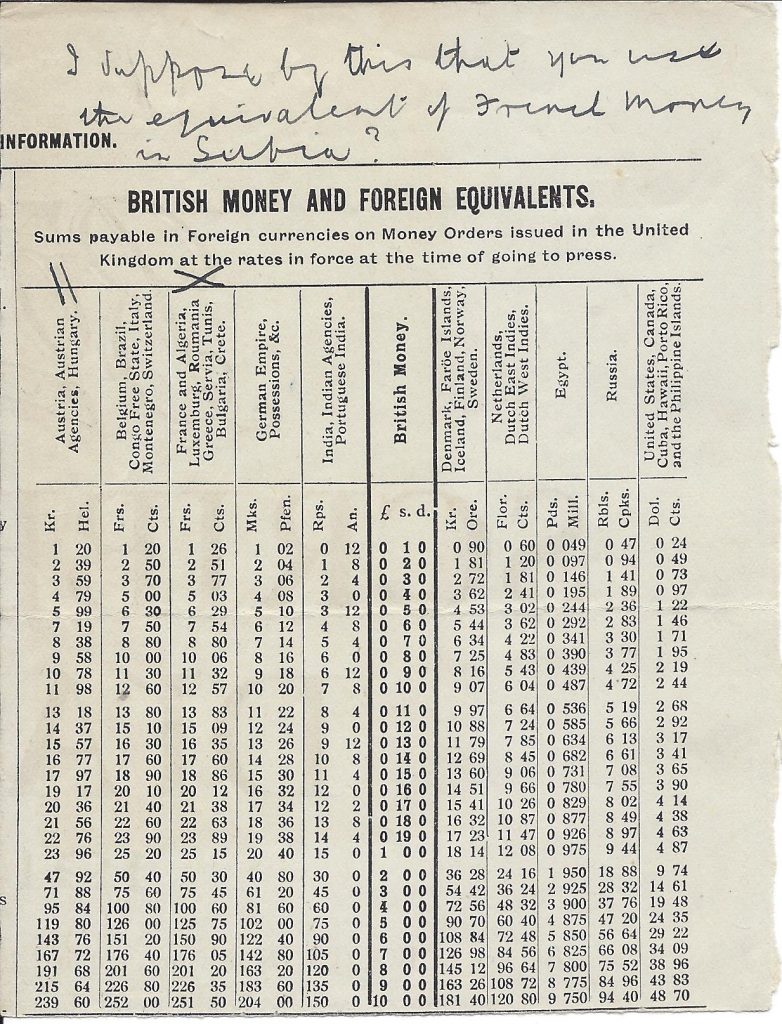
This appears to have been cut from a newspaper, which Margaret must have had access to in Serbia – she was, by now, in a major city (Sarajevo). Most of the other currencies, such as the French Franc have gone, but interesting to see that £1 was worth $4.87 – as opposed to $1.39 when I wrote this.
The reverse of the cutting is also interesting.
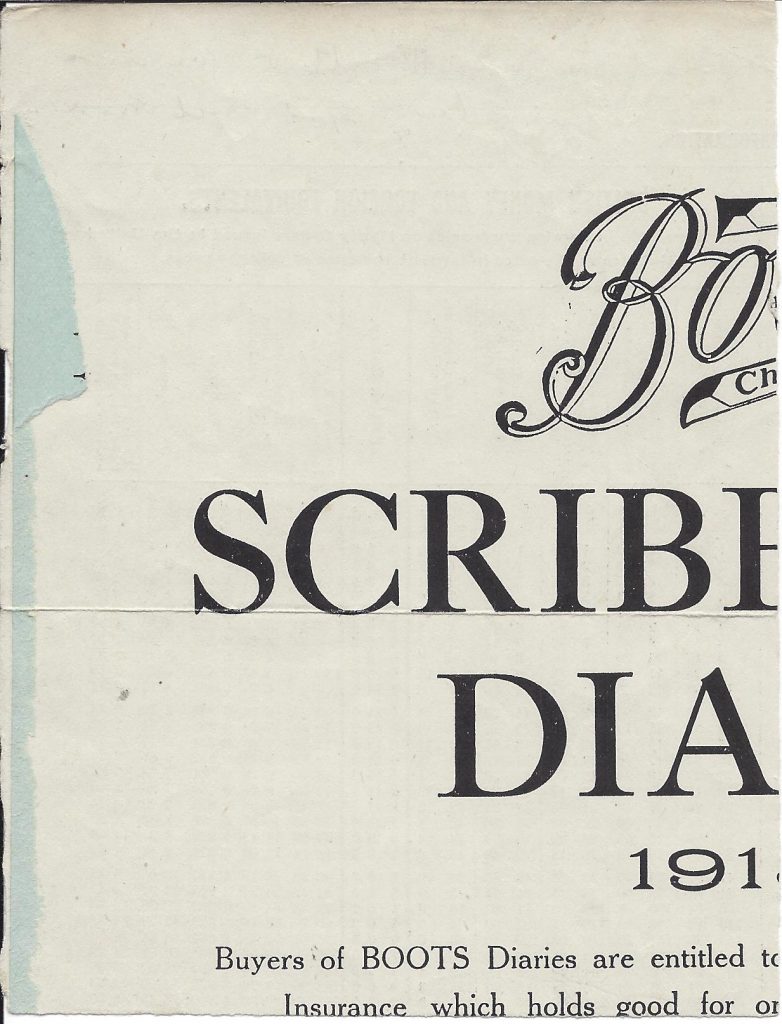
My mother used a Boots Scribbling Diary, which was always one of her requested presents, but it is interesting to see that they date back at least as far as 1919.
The white felt cap

From the description this sounds like a Plis, though that is more often associated with Albanian national costume than Macedonian.

